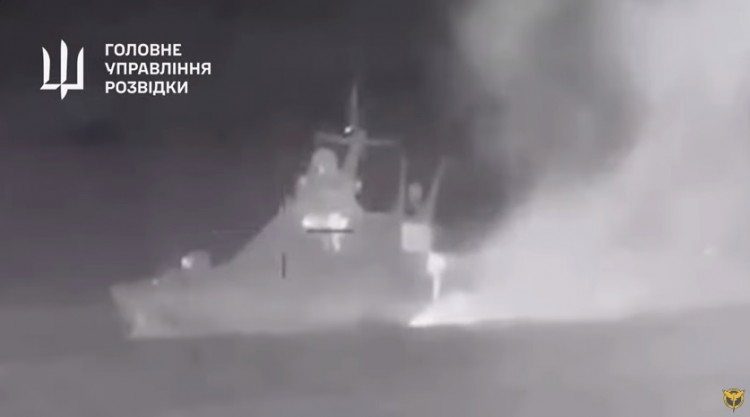Ukraine announced it successfully targeted and sank a Russian patrol ship near the annexed region of Crimea, marking a significant escalation in the ongoing conflict in the Black Sea. The operation, conducted using high-tech sea drones, underscores Kyiv's determination to counter Russian maritime activities in the region, despite facing considerable challenges on land.
The Sergey Kotov, a large patrol vessel of the Russian navy, reportedly fell victim to this innovative form of warfare near the strategic Kerch Strait. Ukrainian military intelligence released footage purportedly showing the moment of the attack, which set the Russian ship ablaze. The fate of the Sergey Kotov's crew, which is said to number around 60, remains uncertain as Moscow has yet to confirm the incident.
This latest maritime engagement highlights Ukraine's increasing reliance on unmanned sea drones, a relatively new addition to its arsenal that has proven to be both lethal and morale-boosting. These sophisticated devices, capable of carrying significant payloads over considerable distances, represent a new frontier in modern warfare, challenging traditional naval power dynamics.
Kyiv's deployment of these drones is part of a broader strategy to assert control over the Black Sea, vital for grain exports and other economic activities. Previous successful operations include the sinking of other Russian vessels, demonstrating Ukraine's ability to project power at sea and disrupt Russian naval operations.
The innovative use of sea drones by Ukraine, including the advanced Magura V5 model, has garnered attention for its potential to change the landscape of naval warfare. With capabilities that include live video feeds to operators and stealthy approaches to targets, these drones offer a cost-effective method of inflicting damage on far more expensive enemy assets.
Funding for these drones, each costing approximately $250,000, is sourced through United24, a government-backed crowdfunding initiative. This approach not only showcases Ukrainian ingenuity in drone design and manufacturing but also highlights the global community's role in supporting Kyiv's defense efforts.
Russia's occupation of Crimea in 2014 significantly diminished Ukraine's naval capabilities, making the development and deployment of such unmanned vessels a critical component of Ukraine's strategy to reclaim maritime superiority. The success of these drone strikes not only inflicts material losses on the Russian fleet but also serves as a symbolic victory for Ukraine, boosting morale among its forces and supporters.
As the conflict continues, the use of unmanned sea drones by Ukraine could potentially reshape the naval engagements in the Black Sea, introducing a new era of warfare where innovation and technology play pivotal roles. The international community watches closely as these developments unfold, recognizing the implications for future conflicts and the balance of power in contested waters.






